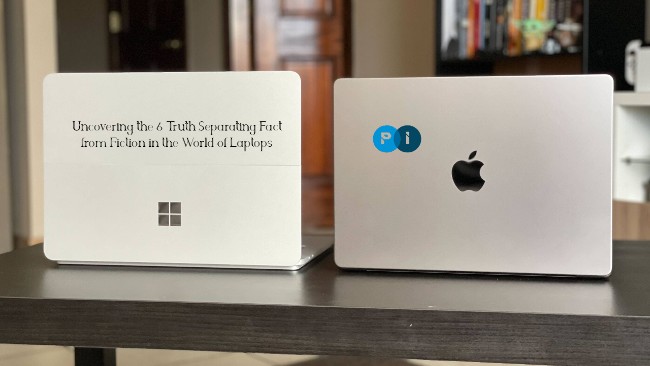
The world of laptops is vast and ever-evolving, and with the constant influx of new models, features, and technologies, it can be challenging to separate fact from fiction. There are numerous misconceptions and misleading information about laptops circulating online, and it can be difficult to determine what information is accurate and what is not.
[content-egg module=AmazonNoApi template=grid]
Contents:
Myths from fiction in the world of laptops.
Myth 1: Macs are more expensive than Windows laptops
One of the most common misconceptions about laptops is that Macs are more expensive than Windows laptops. This is only partially true. While it’s true that the price of a MacBook can be higher than a similar Windows laptop, there are many factors that contribute to the cost difference. Macs are known for their premium build quality, sleek design, and user-friendly interface. These features come at a premium, and that is reflected in the price of a MacBook.
However, it’s important to note that there are Windows laptops that are just as expensive as Macs, and there are also many affordable Windows laptops that offer similar features and performance. The cost of a laptop ultimately depends on its specifications, features, and brand, and it’s not accurate to say that Macs are more expensive across the board.
Myth 2: Macs are less prone to viruses and malware than Windows laptops
Another commonly held belief is that Macs are less prone to viruses and malware than Windows laptops. This myth has been perpetuated by the notion that Macs have a lower market share than Windows laptops, making them less of a target for hackers and malware developers.
However, the reality is that Macs are not immune to viruses and malware. Macs are built on the Unix-based operating system, and while Unix is known for its security, it is not invulnerable. Macs have been targeted by malware in the past, and the number of threats targeting Macs is increasing.
The best way to protect your Mac or Windows laptop from viruses and malware is to use a reputable antivirus software and to exercise caution when downloading and installing software or opening attachments from unknown sources.
Myth 3: Laptops with dedicated graphics cards are always better for gaming
Another common misconception about laptops is that laptops with dedicated graphics cards are always better for gaming. While it’s true that dedicated graphics cards offer better performance than integrated graphics cards, the overall performance of a laptop for gaming depends on many other factors, such as the processor, memory, storage, and display.
A laptop with a powerful processor, ample memory, and fast storage can still offer excellent gaming performance, even if it has an integrated graphics card. On the other hand, a laptop with a dedicated graphics card but weak other components will not provide a good gaming experience.
In general, laptops with dedicated graphics cards are better suited for demanding games and tasks that require high performance, but the overall performance of a laptop for gaming depends on the balance of all its components, not just the graphics card.
Myth 4: The more expensive a laptop, the better it is
The idea that the more expensive a laptop is, the better it is, is not always true. While it’s true that more expensive laptops often offer better performance, features, and build quality, the cost of a laptop depends on many factors, such as its specifications, brand, and target audience.
A laptop that is aimed at gamers or professionals will often be more expensive than a laptop aimed at students or general consumers. Similarly, a laptop from a premium brand, such as Apple or Dell, will often be more expensive than a laptop from a lesser-known brand.
It’s important to understand your needs and requirements when buying a laptop and to consider what features and specifications are important to you. It may be tempting to buy the most expensive laptop available, but this may not always be the best choice. Instead, you should focus on finding a laptop that provides the right balance of performance, features, and cost for your needs.
Myth 5: Laptops are more fragile than desktops
Another misconception about laptops is that they are more fragile than desktops. While it’s true that laptops are more portable and can be more easily damaged, many modern laptops are built to withstand rough handling and are designed to be durable.
[content-egg module=Impactradius template=grid]
Many laptops now come with rugged designs, spill-resistant keyboards, and reinforced hinges, making them less likely to be damaged in everyday use. Additionally, many laptops are tested to military-grade standards, ensuring that they can withstand extreme conditions and rough handling.
That being said, laptops are still more prone to damage than desktops, as they are designed to be portable and are often carried around. To minimize the risk of damage, it’s important to use a protective laptop case and to exercise caution when handling your laptop.
Myth 6: Touchscreens are not necessary on laptops
Another common myth about laptops is that touchscreens are not necessary. Touchscreens have become more common on laptops in recent years, and while they are not essential for everyone, they can provide a more intuitive and interactive experience for some users.
Touchscreens are especially useful for users who frequently use tablet-style apps, such as drawing or painting programs, as they provide a more natural and precise way of interacting with the interface. Additionally, touchscreens can be useful for users who prefer using gestures and touch-based navigation, as they eliminate the need for a touchpad or mouse.
While touchscreens are not necessary on laptops, they can provide an enhanced user experience for some users and are definitely worth considering if you are in the market for a new laptop. In conclusion, the world of laptops is filled with myths and misconceptions, and it can be challenging to separate fact from fiction. By understanding the truths behind these common myths, you can make informed decisions when choosing a laptop that meets your needs and requirements. Remember to consider your needs, focus on finding a laptop that provides the right balance of performance, features, and cost, and exercise caution when handling your laptop to ensure its longevity.






